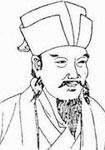奉和鲁望樵人十咏·樵家
云萝共夙世,猿鸟同生涯。
衣服濯春泉,盘餐烹野花。
居兹老复老,不解叹年华。
作者皮日休简介
 皮日休,字袭美,一字逸少,生于公元834至839年间,卒于公元902年以后。曾居住在鹿门山,自号鹿门子,又号间气布衣、醉吟先生。晚唐文学家、散文家,与陆龟蒙齐名,世称"皮陆"。今湖北天门人(《北梦琐言》),汉族。咸通八年(867)进士及第,在唐时历任苏州军事判官(《吴越备史》)、著作佐郎、太常博士、毗陵副使。后参加黄巢起义,或言“陷巢贼中”(《唐才子传》),任翰林学士,起义失败后不知所踪。诗文兼有奇朴二态,且多为同情民间疾苦之作。《新唐书·艺文志》录有《皮日休集》、《皮子》、《皮氏鹿门家钞》多部。
皮日休,字袭美,一字逸少,生于公元834至839年间,卒于公元902年以后。曾居住在鹿门山,自号鹿门子,又号间气布衣、醉吟先生。晚唐文学家、散文家,与陆龟蒙齐名,世称"皮陆"。今湖北天门人(《北梦琐言》),汉族。咸通八年(867)进士及第,在唐时历任苏州军事判官(《吴越备史》)、著作佐郎、太常博士、毗陵副使。后参加黄巢起义,或言“陷巢贼中”(《唐才子传》),任翰林学士,起义失败后不知所踪。诗文兼有奇朴二态,且多为同情民间疾苦之作。《新唐书·艺文志》录有《皮日休集》、《皮子》、《皮氏鹿门家钞》多部。
诗词《奉和鲁望樵人十咏·樵家》的中文译文如下:
空山最深处,
There are only a few families in the deepest part of the empty mountains.
太古两三家。
For ages, only two or three families have lived here.
云萝共夙世,
With the lingering clouds as their companions for generations,
猿鸟同生涯。
The monkeys and birds share the same life.
衣服濯春泉,
They wash their clothes in the spring water of the mountain,
盘餐烹野花。
And have simple meals with wild flowers as their ingredients.
居兹老复老,
Living here, they grow old and older,
不解叹年华。
Unable to help but sigh at the passing of time.
这首诗描绘了深山中一个樵夫的生活。樵夫生活在空山深处,与云雾为伴,和猿猴、鸟穿同生活。他们的生活非常简朴,洗衣服用山泉的水,用野花烹饪食物。樵夫们年纪渐长,却无法停止对岁月流逝的叹息。
这首诗以简洁明了的语言,展示了深山中樵夫的自然生活。通过山水和鸟兽的描绘,诗人表达了樵夫们与自然紧密相连的生活方式。诗中的年华时光流逝的主题,反映了诗人对时间流转的思考和对生命短暂性的感慨。整首诗以平实的语言,传达了对自然和生命的敬畏之情,引发读者对于生命和时间的深思。
fèng hé lǔ wàng qiáo rén shí yǒng qiáo jiā
奉和鲁望樵人十咏·樵家
kōng shān zuì shēn chù, tài gǔ liǎng sān jiā.
空山最深处,太古两三家。
yún luó gòng sù shì, yuán niǎo tóng shēng yá.
云萝共夙世,猿鸟同生涯。
yī fú zhuó chūn quán, pán cān pēng yě huā.
衣服濯春泉,盘餐烹野花。
jū zī lǎo fù lǎo, bù jiě tàn nián huá.
居兹老复老,不解叹年华。
